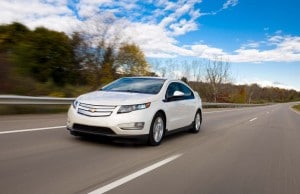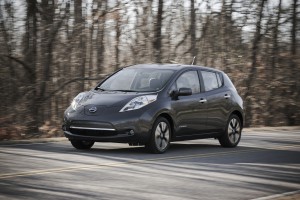
Sales of plug-in hybrids and electric vehicles have stumbled in recent months, and industry analysts put much of the blame on low gasoline prices, but other factors may be at work, a new study showing residuals, or trade-in prices, for battery-cars have been falling rapidly.
EV proponents have long used two separate arguments to promote the technology. They emphasize its environmental benefits. But they also focus on the potential cost savings by turning to relatively cheap electricity, rather than gasoline, to move the metal down the road.

The financial pitch is becoming a much harder sell these days, as gasoline prices hover well below their spring 2014 peak of about $4 a gallon. And a plunge in residuals could wipe out those fuel cost savings entirely.
“The electric car premium over a counterpart gasoline model for mainstream brands has pretty much disappeared for used vehicles from an average premium of $16,600 for new vehicles,” notes a summary of new research by the Black Book, a service that tracks used vehicle pricing. “In fact, in a couple of cases, a used electric model now costs less than (its) gasoline counterpart.”

A new 2012 Nissan Leaf SV, for example, at $36,380, cost $20,287 more than a comparable Nissan Versa SL hatchback. Even after working in the federal tax incentive of $7,500, the “electric premium” was $9,660.
But after three years on the road, that Leaf now has a residual of just 26% of its original price, compared to 43% for the Versa. In terms that matter to an owner, the gas-powered hatchback is worth about $8,300 at trade-in, or $900 more than the battery-electric Leaf.
That pattern holds for the three other mainstream electric vehicles that Black Book analyzed. The Mitsubishi i-MiEV starts out with a retail price of $9,405 more than the maker’s Lancer hatchback. Even after the federal tax credits the battery-car costs $1,905 more. But after three years, the i-MiEV holds only 25% of its original value, the Lancer 43%, so the gas model is now worth $3,100 more.
The Ford Focus Electric is still commanding an $1,100 higher trade-in price than the comparable gas model, but it came to market at $40,387, or nearly twice the price of the Focus SE gas model, and still cost $12,337 more after rolling in the tax credit. The Focus Electric has held just 31% of its original value compared with 44% for the gas model.
(Tesla deliveries fall short as EV maker cuts outlook. For more, Click Here.)
The 2012 Chevrolet Volt, the first mainstream plug-in hybrid, holds just 32% of its initial price, compared to 49% for the comparable Chevy Cruze, according to the Black Book study. The Volt will get about $650 at trade-in, but at $40,431, it was nearly double the $20,144 for a Cruze sedan. And even after the federal tax credit it commanded an electric premium of nearly $13,000.
The low residuals for battery-based models, such as the Leaf and Volt, reflect, in part, the current softness of the battery-car market. U.S. consumers have shifted away from high-mileage offerings to less fuel-stingy crossovers, utility vehicles and pickups at a time of cheap gas.
Through July, total plug-in and battery-electric sales in the U.S. totaled just 60,964, down from 67,533, according to InsideEVs.com, a website that tracks alternative vehicle technology.
(Click Here for details about a new California initiative searching for a battery breakthrough.)
A surge in demand for new battery-based models would likely also result in a jump in demand for used models – with a concurrent increase in residuals.
Meanwhile, though the Black Book study looks at trade-in values for 2012 battery-cars things have changed a lot over the last three years. For one thing, manufacturers have repeatedly cut prices on those electrified models. That reflects both reduced battery costs and the need to broaden the appeal of these products.
(Chevy says 2nd-generation Volt plug-in will get 53 miles per charge, a 40% bump. Click Here for more.)
The new 2016 Chevrolet Volt will carry a base MSRP of $33,395, down $1,200 from the 2015 model despite getting a complete redesign and 40% more range on battery power. After the federal tax credit its price dips to $26,495. That’s far less of an electric premium than for the original model. But whether it will still lose value faster than a comparable, gas-powered Chevy remains to be seen.








I don’t know what other states have done, but with the realization that EV drivers pay less on fuel tax, the legislature canceled the substancial State tax credit and bumped the yearly tag renewal fee from $20 to $200 for EV’s.
It’s about time that EV driver’s pay their fair share for road use instead of getting tax breaks for buying an impractical vehicle.
There should also be a toxic waste tax applied to all EVs as tax payers are the ones who will ultimately end up paying for the toxic waste mess when these EVs are scrap materials in just a few years time.
Anyone who services or stores EVs will likely end up paying higher insurance fees as a result of the documented fires that have occurred in these vehicles before, during and after crashes.
It is important to do an apples to apples comparison. The LEAF S is most comparable to a Sentra SV (check the features and specs). Then subtract the federal tax credit for LEAF, also many states have an additional credit which must be accounted for unless you are excluding those states.
Then the fuel savings must be calculated. The more you drive the more you save. Save even more if you have solar power.
There are other benefits that also need to be counted but vary by state. Reduced registration fees, solo carpool lane access, etc. Then there are other benefits of driving electric like NO GAS, no exhaust, smooth, quiet, easy to drive, and fun to drive.
Full disclosure, I am a Nissan employee. I just placed an order to lease my sixth LEAF in a row. 🙂
And ALL of those incentives, perks, etc. should never have been given. Unless electricity is free, which it is not for most, nor is solar power, EVs make no sense for probably 98+ percent of the world. There is a very good reason why electric vehicles died out at the beginning of the 1900’s. Consumers are voting with their wallet and the answer is “no”.